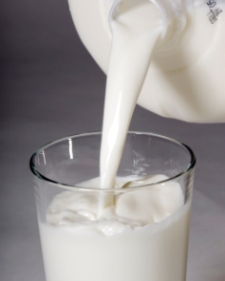Milk is not recommended for adults for many reasons. The enzymes necessary to break down and digest milk are renin and lactase, which in most humans have already disappeared after three years.
 In all kinds of milk there is a substance called casein, but in cow’s milk there is three hundred times more casein than in human milk, so much larger bones can be formed. In the stomach, casein coagulates, forming large, dense, difficult-to-digest flakes, adapted to the digestive system of the cow, which has four stomachs. Once inside the human organism, this dense viscous mass imposes a tremendous effort on the body to free itself from it. In other words: that to digest it a huge amount of energy has to be spent.
In all kinds of milk there is a substance called casein, but in cow’s milk there is three hundred times more casein than in human milk, so much larger bones can be formed. In the stomach, casein coagulates, forming large, dense, difficult-to-digest flakes, adapted to the digestive system of the cow, which has four stomachs. Once inside the human organism, this dense viscous mass imposes a tremendous effort on the body to free itself from it. In other words: that to digest it a huge amount of energy has to be spent.
Unfortunately, this viscous substance hardens in part, and sticks to the lining of the intestine, preventing the body from absorbing other nutrients.
Result: lethargy. In addition, the by-products of milk digestion leave a large amount of toxic mucus in the body, highly acidifying, which is partially stored in the body pending the moment when it can eliminate it. The next time you are about to remove the dust from your house, spread it all with some paste and you will see, how easy it is to pass the duster.
So do dairy products inside your body. And that translates into weight gain, not weight loss. Casein, by the way, is the basis for one of the strongest adhesives used in carpentry.
On earth there is a mammal, man, who is never, ever weaned. Why? Naturally, it is difficult to objectively pose the problem, given all that wealth of conflicting information, but ask yourself for a moment: Have you ever seen a zebra suckling from a giraffe? Not? And a dog from a mare? Either? Well, have you ever seen a human suckling a cow? The three
examples are equally ridiculous. But you have seen human beings suckling cows, because if you ever saw how someone drank a glass of milk or ate any kind of dairy product. What you have seen is that. Just because someone has milked the cow and a distribution system delivers it to the consumer in a glass does not mean that that person is not suckling the cow.
There are people who insist that dairy is necessary, because of calcium. We have been led to believe that milk is an important source of calcium, and that if we do not drink milk our teeth will fall out or our bones will disintegrate. To begin with, the calcium in cow’s milk is much coarser than that in human milk. and it is associated with casein, which prevents the body from absorbing it.
Additionally, most milk drinkers and cheese eaters consume pasteurized products that have been homogenized or subjected to some other form of processing, which degrades calcium and makes it extremely difficult to use. And even if the products were consumed raw, is the milk’s harmful potential such that it does not compensate for any possible good?
Would you eat tobacco leaves because of their high amino acid content? The human body has a remarkable capacity for adaptation, but cow’s milk is simply not intended for man.
The fact is that all green leafy vegetables contain calcium. All nuts (raw) contain calcium. And raw sesame seeds contain more calcium than any other food on earth. Also most fruits contain it.
If you eat raw fruits and vegetables and some nuts daily, even occasionally, you cannot have a calcium deficiency. The best sources of calcium are raw sesame seeds, all raw nuts, seaweed (iziki, kelp, sweet), all leafy vegetables, and concentrated fruits, such as figs, dates, and prunes.
And if you’re still worried about this, sprinkle some raw, ground sesame seeds on salads or vegetables from time to time. and you will not be able to have a calcium deficiency no matter how hard you try. Undoubtedly, to supply ourselves with calcium we do not depend on our friends the cattle. Cow? where do you get your calcium? From grains and grass! And they sure don’t drink milk or eat cheese to assure you.
Do you want a healthier option? Try the Almond Milk, it is very tasty, you will not regret it!